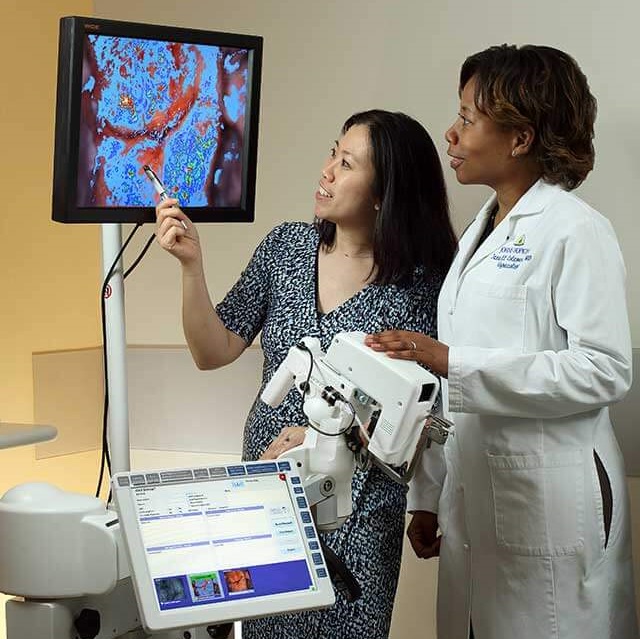-
Betty Chou, MD

- Director of Residency Program (GYN/OB)
- Assistant Professor of Gynecology and Obstetrics
-
Jenell S. Coleman, MD MPH

- Director, Division of Gynecologic Specialties
- Associate Professor of Gynecology and Obstetrics
Cervical Disease Screening (Colposcopy) and Treatment at Johns Hopkins
 Doctors Chou and Coleman assess imaging on new colposcopy device.
Doctors Chou and Coleman assess imaging on new colposcopy device.If you have had an abnormal pap smear, our experts can help you understand your results and discover any conditions that may require further treatment. To diagnose and treat these conditions early, when they are easier to treat, we use a range of tools including colposcopy (a specialized procedure performed to examine the cervix, vagina or vulva) and loop electrosurgical excision procedure, or LEEP (a procedure that uses an electrical wire loop to remove abnormal cells or tissue).
Cervical Disease Screening and Treatment: Why Choose Johns Hopkins
- Our expert team uses the latest technology to diagnose potential cervical disease or other conditions. The Colposcopy Clinic at The Johns Hopkins Hospital uses a state-of-the art device that allows your doctor to more easily and precisely find areas that require biopsy and displays the images in real time for your review throughout the procedure.
- Our clinics are fully equipped for various treatments and therapies, including cryotherapy (freezing abnormal cervical cells) and LEEP.
- We are located at many convenient care locations throughout Baltimore City, Baltimore County and Anne Arundel County, including The Levi Watkins, Jr, MD, Outpatient Center, Johns Hopkins Bayview Medical Center and our health care and surgery centers at Green Spring Station, White Marsh and Odenton.
- Patients with cervical dysplasia and HPV can receive advanced care at the Cervical Dysplasia Center at the Johns Hopkins Kimmel Cancer Center. These experts develop advanced treatments — including breakthrough immune therapies — that treat cervical changes caused by HPV and prevent cervical cancer.
Cervical Disease Screening and Treatment: What to Expect
On the day of your procedure, you will meet with one of our providers to review your abnormal Pap smear report and ask any questions you may have about the procedure. We will then perform the colposcopy.
Your provider will start the procedure by placing a diluted, vinegarlike solution on your cervix, which will turn areas with abnormal cells a bright white so they are easier to see. He or she will then use a colposcope (a specialized type of microscope) to better view your cervix under magnification. Your doctor will take a closer look at those bright white areas and, if necessary, take a very small tissue sample to submit to the laboratory for analysis, also known as a cervical biopsy.
Some women experience discomfort from the biopsy, so you may want to take ibuprofen right before your appointment. Spotting is also common afterward, so we will provide you with a sanitary napkin after the procedure.
Once we receive your biopsy results, we will schedule a follow-up appointment with you to discuss your results, what treatment options are available and what type of follow-up is recommended. Treatment may include repeat Pap smear and HPV testing or surgical procedures such as LEEP, cold knife conization or other therapies and depends on the severity of your condition and your preferences.
Our Team
Physicians








